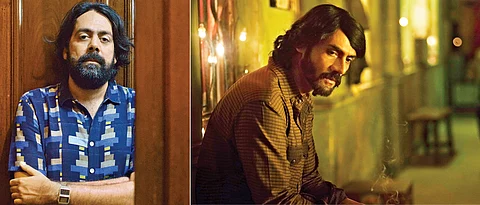

After directing the critically-acclaimed Miss Lovely (2012), filmmaker Ashim Ahluwalia disappeared for a while, but is now back after five years with Arjun Rampal-starrer Daddy, based on Mumbai-based gangster Arun Gawli. The filmmaker says that he was busy with his international projects for a while. “I anyway work slowly because I am not a fast filmmaker. Once I start working, I get completely immersed in it. I was also developing a few international projects after Miss Lovely. We also took two and a half years to work on Daddy,” says Ashim while promoting his latest.
The film, releasing on September 8, also stars Aishwarya Rajesh, Nishikant Kamat, Anand Ingale and others. Daddy is the first biopic based on Gawli, the politician and former gangster of Dagdi Chawl. Gawli is not the first gangster Bollywood has made a film on. Films on Dawood Ibrahim, Haseena Parker, Chota Chetan and Manya Surve have been made earlier. Why the need to highlight gangsters in films? “I don’t know about others but for me Arun Gawli is a fascinating character. I knew about him before working on the film. I am a Mumbai-boy and have seen and heard about him and the gang wars. Otherwise, a typical Bollywood gangster masala film is not my style. I wanted to make a film which is real and hard-hitting.” He says that Gawli and his family had given them the official rights to make the film, which kind of excited him. “This is the kind of stuff I like doing,” he exclaims.
Ashim adds that he did not want to make a film which is one-sided. “I just want to portray him as a human being. We have shown his character in a different avatar. We have shown him as a husband, father, son and someone who also gets scared. The film captures his life in a span of 40 years. He is quite a crazy, complex character.” The filmmaker says that when one makes a biopic on a person who is alive, it’s a huge responsibility. “Though this is not the first biopic on a gangster but we still had a responsibility towards the person (Gawli). We had to make sure it was a fair portrayal and doesn’t white wash facts. There are legal issues involved and we had to be balanced,” he quips.
While shooting the film, did he ensure that they don’t end up portraying Gawli as a heroic character? “Honestly, even I was concerned about that. The idea was to present the true Gawli and stick to facts.”
During the course of the film, the team including Ashim had met Gawli in jail. Ask him about his observation about the man and he replies, “My first observation was that he is a quiet man, but observes everything happening around him. Even though he did not speak, I was aware of him being in the same room. Because of his past, he is paranoid and sensitive to all kinds of sounds around him. I also realised that though he is powerful, he doesn’t like flaunting it. He is a typical Maharashtrian middle-class man.” He adds that Gawli was honest with the questions we had for him.
While Ashim comes from the off-beat independent kind of filmmaking, Arjun is a out-and-out commercial actor. How did they draw the balance between the two styles of filmmaking? “I think it was a very interesting collaboration. He wanted to do something different and wanted to attempt a character he has never done before. He transformed himself according to the real character. I did not want to compromise on my style of filmmaking and wanted to work with an actor who is true to himself and realistic,” says the filmmaker who is next working on an international sci-fi project.
The changing trend of storytelling in Bollywood, says Ashim, has made it possible for him to work here. “Five years ago, I would have had a tough time. I am anti-industry because they fantasise their actors and push filmmakers to a corner. Though filmmaking is a director’s medium, they are given least importance. But now mainstream cinema is close to belief, which obviously is a giant shift,” he says, adding that it’s not just the audience but producers too who are changing.
